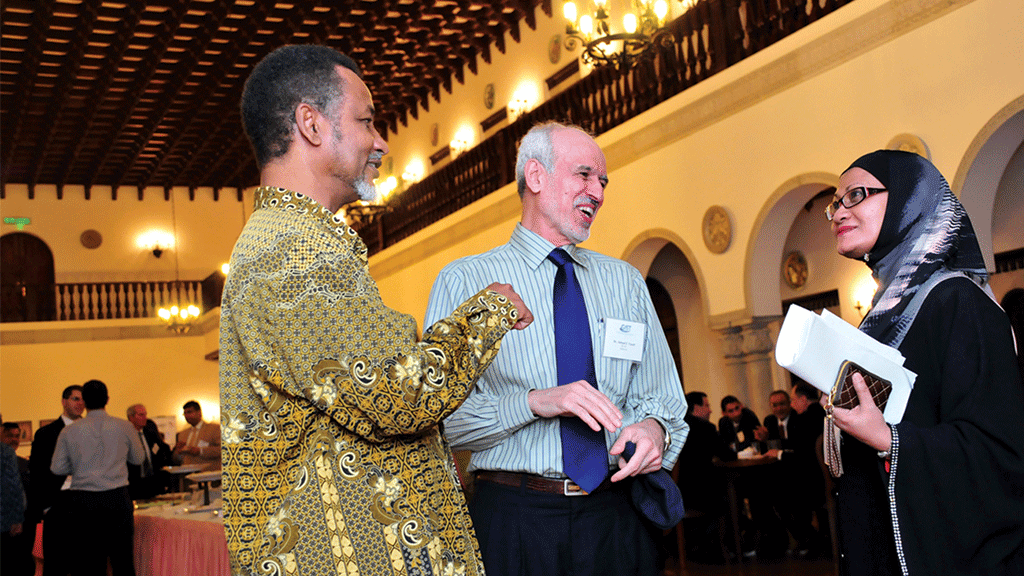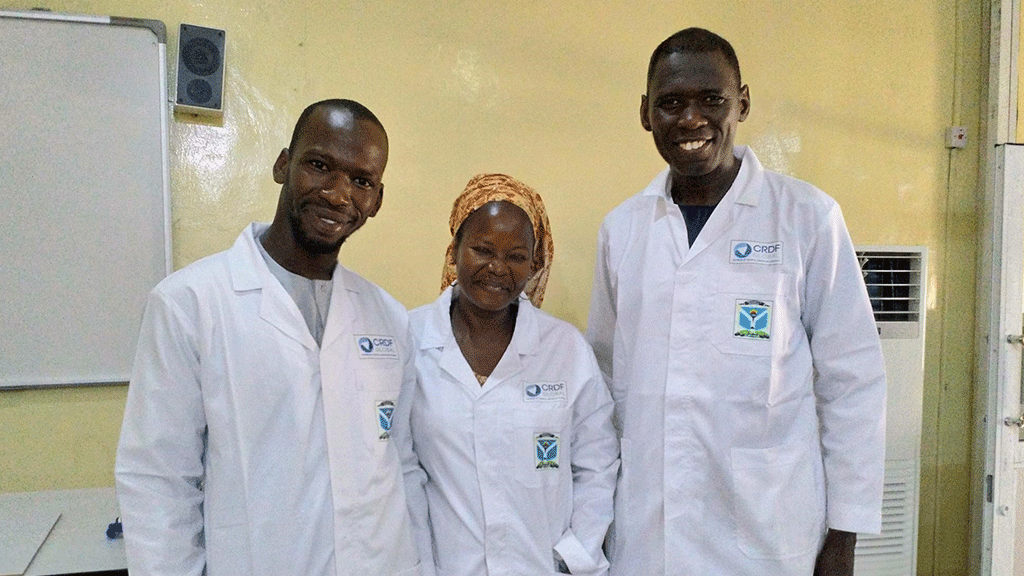CRDF Global Launches 2024 Fellowship Program to Empower Women Working in Nuclear Security and Nonproliferation

The 2024 Cohort of Fellows, from top row, left to right: Rubina Waseem (National University of Science and Technology), Regina Alachi (Nuclear-Aware Africa), Pamela Kageliza Kilavi (Strathmore University), Lujain Khalaileh (Jordan Atomic Energy Commission). Middle row: Keziah Garba (Centre for Energy Research and Training), Josephine Wakuyu (Kenya Nuclear Regulatory Authority), Haleema Saadia (The ROADS Initiative), Carolina Calvo (Center for Non-Proliferation Studies). Bottom row, left to right: Camila Hernández Sánchez (Center for Non-Proliferation Studies), Alpana Goel (Amity University), Helen Miriam (Amity University), and Hebah Eljuhani (Nuclear and Radiation Specialist).
With the generous support of Global Affairs Canada’s (GAC’s) Weapons Threat Reduction Program (WTRP), CRDF Global launched the “Building Networks Between Women to Share Best Practices and Experiences Working in Nuclear Security and Nonproliferation” fellowship program in January 2024. Following the success of the webinar series, mini-grant program, and workshop implemented in 2021–2022 that trained 10 female nuclear professionals, this new iteration engages 12 grantee pairs from six countries in a skills development training series. The fellows will then use the skills developed in the webinar series to implement individual grant projects at their home institutions, culminating in a capstone two-day workshop in Vienna, Austria in October 2024.
The 2024 fellowship includes grantees from Chile, India, Jordan, Kenya, Nigeria, and Pakistan. The fellows’ expertise ranges from nuclear and radiation specialists to researchers, and they represent institutions such as Amity University, Jordan Atomic Energy Commission, Strathmore University, Kenya Nuclear Regulatory Authority, National University of Science & Technology, the Center for Non-Proliferation Studies, The Research on Advancement and Development of Social Sciences (ROADS) Initiative, and Nuclear-Aware Africa. Each woman selected to participate in this program is a leader in her field and highly values mentorship for junior staff, students, and colleagues at their institutions. You can learn more about the individual grantees here.
While women’s representation in the nuclear security and nonproliferation field has grown in the last decade, the gender gap remains substantial when it comes to meaningful participation in decision-making processes. Social norms in many countries prevent women from entering the field, advancing their careers, and being recognized for their contributions. This grant program invests in women around the world to support their involvement in international nuclear security discussions and contributes to the growing nuclear gender champions globally. CRDF Global’s goals with this program are to:
- Improve connectivity among women scientists and researchers in different regions in the world to improve prevention, detection, and/or response of nuclear security and non-proliferation challenges.
- Increase capacity at the grantees’ home institutions to support gender equality programs, strengthen advocacy networks among women and allies, and develop roadmaps to ensure that each grantee project has a sustained impact.
- Share knowledge gains with grantees’ home institutions which leads to strengthening the international nonproliferation regime and nuclear security policy instruments.
- Empowering women advocates in partner countries who will be responsible for developing new culturally appropriate ways for including and promoting more women in the field of nonproliferation and nuclear security.

The opening session of the skill development training series featured distinguished speakers from GAC’s WTRP, the U.S. Department of State’s Bureau of International Security and Nonproliferation, and CRDF Global, highlighting the commitment of various stakeholders to support the advancement of women in traditionally male-dominated fields. A common theme woven through each speaker’s opening remarks was the importance of networks, relationships, and collaboration to increase the meaningful inclusion of women across all levels of international and nuclear security.

Following the opening remarks, CRDF Global featured presentations by and in-depth conversations with several experts in the nuclear field: Anne Harrington, Dr. Lee Peddicord, and Inna Pletukhina. These experts provided practical insights and tools tailored to the needs of the fellows, who come from diverse backgrounds including nuclear regulation and law, policymaking, academia, and engineering. Presenters emphasized the importance of gender-inclusive approaches in the nuclear security and nonproliferation field and highlighted the significant contributions that women have made and can continue to make to the field. CRDF Global then commissioned its internal roster of qualified project management professionals as well as relationships with a growing cadre of nuclear security experts to ensure that the fellows had access to the best resources to guide them through their fellowship projects.
Topics from the sessions include:
Nuclear Law and Policy: Ms. Inna Pletukhina’s (Associate, Nuclear Energy, Energy and Infrastructure Team at Hunton Andrews Kurth LLP) presentation elucidated the nuances of nuclear law and its enforcement mechanisms, underscoring the importance of safety, safeguards, and security in the nuclear domain.
Nuclear Workforce Development: Dr. Lee Peddicord (Professor Emeritus, Texas A&M University Department of Nuclear Engineering) emphasized the need for a diverse and well-prepared nuclear workforce, stressing the significance of safety culture and technical expertise at all levels.
Nuclear Renaissance, Piracy and Terrorism: Ms. Anne Harrington (former Deputy Administrator for Defense Nuclear Nonproliferation for the National Nuclear Security Administration) provided an overview of the catalysts for recent positive changes in global views on nuclear energy and summarized the progress made in nuclear de-escalation and disarmament.
Project Management: Mr. John Madeira (Project Lead, CRDF Global) outlined strategies for generating project ideas and walked fellows through steps before writing a proposal, including examining funding opportunities and ensuring compliance with eligibility criteria. Mr. Brett King (Project Lead, CRDF Global) provided insights into project management fundamentals, including initiation, planning, execution, and closure, equipping participants with essential skills for successful project implementation. Amanda Elias (Airtable Expert) gave a hands-on demonstration of Air Table, a project management application, equipping the fellows with practical knowledge and tools for their respective fellowship projects.
Communication and Marketing: Dr. Julie Fisher (CRDF Global Technical Director for Global Health, Associate Research Professor at Georgetown University) emphasized the importance of clear communication in science, while covering best practices for communicating scientific research. Meg LaBumbard (Communications Manager, CRDF Global) shared strategies for effective communication, branding, and connecting with target audiences, empowering participants to amplify their impact through compelling storytelling and branding strategies. Kelle Barfield (former Director of Nuclear Communication at Entergy New Orleans) focused on stakeholder engagement and risk communication strategies in the nuclear sector. She emphasized understanding the nuances of risk perception and tailoring messaging accordingly.
Monitoring and Evaluation: Abdullah Shinwari (MEL Advisor, CRDF Global) and Urszula Velez (Senior Project Lead, CRDF Global) highlighted the importance of monitoring and evaluation in assessing program effectiveness and driving continuous improvement, using the Kirkpatrick Model as a framework for measuring results.
Insider Threat Mitigation: Using two compelling case studies to demonstrate vulnerabilities and lapses in security protocols, Noelle Camp (Consultant, Camp Research & Consulting, LLC) defined insider threats, identified various motivations, and discussed preventive and protective measures.
Transport of Nuclear Materials: Magda Trafas (Coordination Lead, Nuclear Transport Solutions), delivered an overview of nuclear transport, highlighted its pivotal role as an industry enabler, and elaborated on the associated risks and challenges. She also discussed current threats such as terrorism and cybersecurity and the need for innovative security approaches.
Gender Diversity in Nuclear Security and Science, Technology, Engineering, Math, and Medicine (STEMM): Viviana Espinosa (Project Manager, World Institute for Nuclear Security) explained the connection between peaceful nuclear applications, nuclear security, and principles of gender equality, diversity, inclusion, and accessibility (DEIA). She highlighted that gender equality is essential for achieving nuclear-related Sustainable Development Goals, particularly in health, innovation, and climate action. Espinosa emphasized the need to incorporate DEIA principles into nuclear security practices to prevent biases and stereotypes from creating vulnerabilities that could undermine security efforts. Next, Kimberly Ma (Policy Analyst, U.S. National Security Commission on Emerging Biotechnology) presented the Breaking Barriers report, highlighting challenges faced by women in STEMM fields and national security. Key issues included lack of career knowledge and mentors, imposter syndrome, inflexible career parameters, and underrepresentation of women’s contributions.
Panels
Throughout the fellowship webinar series, participants engaged in interactive sessions, hands-on demonstrations, and knowledge-sharing activities, enhancing their skills and building networks for future collaboration. The commitment of CRDF Global and GAC to gender equality and capacity building was evident in the comprehensive support provided to the fellows, including access to resources and opportunities for ongoing mentorship.
As the Building Networks Among Women Fellowship program continues, it holds the promise of empowering a new generation of women leaders in nuclear security and nonproliferation, driving positive change, and advancing global security objectives. CRDF Global is proud to help advance GAC’s Feminist International Assistance Policy that aims to support gender equality and the empowerment of women and girls to build a more peaceful, inclusive and prosperous world.
Feedback from the fellows highlights the impact of the webinar series on equipping them to implement their mini-grant projects over the coming months:
- One fellow noted that the “tools presented in [the] sessions [focusing on project management, scientific writing and communication] should be mandatory for any graduate and PhD student,” adding that she and her partner will be implementing these topics in their grant project. Three other fellows echoed similar sentiments saying that the resources are “tools for empowerment too.”
- After the session about nuclear communication, one fellow noted, “I am going back to the basics of telling a story about myself. I had given up on this.”
- In summarizing the benefits of the sessions, one fellow shared, “All of the speakers are experts in their field, and I loved learning from their experiences and expertise.”
- At the conclusion of a panel in which distinguished women in the nuclear field shared their experience and advice and explained how they’ve seen the field change over the course of their careers, one fellow remarked, “I wish I had heard this 10 years ago when I was just starting my career; I would’ve benefitted from it so much!”
- Fellows also shared how the advice and experiences shared in the panel discussions will impact their current roles. One fellow remarked, “The talk was truly eye-opening and motivating for me as a first-year PhD student. I hope that if I face similar challenges, I will remember and draw inspiration from each of your words. Thank you for sharing your experiences and wisdom.” Another fellow added, “This session has re-motivated me. I will walk differently tomorrow in my class now.”
The Building Networks Among Women Fellowship program represents a holistic approach to advancing gender equality and professional development in the field of nuclear security and nonproliferation. By combining skill development, grant projects, and international collaboration, the program empowers women to become leaders and change-makers in their communities and beyond. CRDF Global is grateful for the opportunity to build a platform for women experts to share their success stories, build skills necessary to advance to the next stage of their career, and tackle common challenges women face in the nuclear security and non-proliferation field. CRDF Global hopes this program can serve as an example of the power of building resilient networks through collaboration, teamwork, and dedication.



